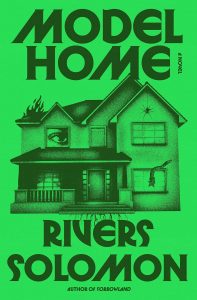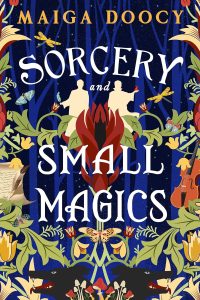Model Home by Rivers Solomon: Review by Gary K. Wolfe
 Model Home, Rivers Solomon (MCD 978-0-374-60713-5, $28.00, 304pp, hc) October 2024.
Model Home, Rivers Solomon (MCD 978-0-374-60713-5, $28.00, 304pp, hc) October 2024.
“Everyone believes in haunted houses,” says Ezri, the narrator of Rivers Solomon’s Model Home, and who’s to argue? Based on the resurgence of the theme in the past couple of years alone, it’s proved to be not only a durable framework for supernatural shenanigans, but a kind of magical mirror for all sorts of issues ranging from artistic creation (Elizabeth Hand) to rural poverty (Alix E. Harrow) to reality TV (Sarah Pinsker). To paraphrase Tolstoy, suburban tract houses may all be alike, but every haunted house is haunted in its own way. In the case of Model Home, the haunting involves not only the house of the title, a McMansion in an upscale suburb of Dallas, but the challenges faced by the first Black family to move into the development, and in particular by the three grown siblings (sisters Emmanuelle and Eve and genderfluid narrator Ezri), who have long ago escaped the house – which they all are convinced is cursed and malignant. While Emmanuelle reflects the materialistic ambitions of the parents, Eve has become a rebellious artist who homeschools her kids and raises them without gender assignments, and Ezri has moved to England and converted to Judaism. Summoned home by their sisters after some disturbing texts from the mother, Ezri discovers both parents dead, in what the police regard as a murder-suicide.
From the beginning, the notion of haunting is associated with the siblings’ mother, with recurring references to Ghost Mother and Nightmare Mother and the recurring refrain “Mother is God,” but we quickly come to suspect that this is as much a feature of Ezri’s narration and memory as of any demonic forces. To be sure, the siblings share horrific memories, such as a bath mysteriously laced with sulfuric acid and a neighborhood boy who disappears after taking on a bet to stay in the house alone for only a half-hour. But Ezri calls her own narration into question when she offers a litany of her various diagnoses: “BPD (borderline personality disorder), OSDD (other specified dissociative disorder), NPD (narcissistic personality disorder), C(omplex)-PTSD, and GAD (generalized anxiety disorder).” Early on, she strives to become a “sliver,” because “slivers fit between cracks”; later she identifies with the imprisoned child in Le Guin’s “The Ones Who Walk Away from Omelas” (“I feel like Omelas was my whole childhood”). Another antecedent Solomon invokes is Lorraine Hansberry’s groundbreaking play A Raisin in the Sun, which also dealt with a Black family moving into an all-white neighborhood, but Ezri’s family is far more affluent to begin with than Hansberry’s, choosing to move from New York to Texas, and while racism and segregation are factors, they are far from the only challenges that the family faces, ranging from homophobia, body-shaming, and gender bias to child abuse and predation. Even Ezri’s own young daughter seems endangered after coming into contact with the house.
Model Home is a novel of endlessly surprising depth and complexity, not only because of Ezri’s compelling narrative voice, but because of the richness of characterization of the siblings; Ezri’s daughter, Elijah; and secondary characters; such as the apparently supportive neighbor Laurie. Only the parents remain something of a cipher, too proud to give up their suburban affluence despite the manifest dangers of the house, overbearing yet in some ways determined and courageous. But the parents seem just as much a mystery to Ezri, and the larger mystery of whether all those eldritch happenings are really the house “hating” the family, as the siblings believe, or an expression of the family’s own issues (which are pretty Gothic in their own right), provides a throughline of suspense. In the end, what often feels like an ongoing cry of agony from a deeply troubled narrator turns out to be an ingeniously plotted tale as well, and one that both honors and radically subverts its classic tradition.
Interested in this title? Your purchase through the links below brings us a small amount of affiliate income and helps us keep doing all the reviews you love to read!


Gary K. Wolfe is Emeritus Professor of Humanities at Roosevelt University and a reviewer for Locus magazine since 1991. His reviews have been collected in Soundings (BSFA Award 2006; Hugo nominee), Bearings (Hugo nominee 2011), and Sightings (2011), and his Evaporating Genres: Essays on Fantastic Literature (Wesleyan) received the Locus Award in 2012. Earlier books include The Known and the Unknown: The Iconography of Science Fiction (Eaton Award, 1981), Harlan Ellison: The Edge of Forever (with Ellen Weil, 2002), and David Lindsay (1982). For the Library of America, he edited American Science Fiction: Nine Classic Novels of the 1950s in 2012, and a similar set for the 1960s. He has received the Pilgrim Award from the Science Fiction Research Association, the Distinguished Scholarship Award from the International Association for the Fantastic in the Arts, and a Special World Fantasy Award for criticism. His 24-lecture series How Great Science Fiction Works appeared from The Great Courses in 2016. He has received six Hugo nominations, two for his reviews collections and four for The Coode Street Podcast, which he has co-hosted with Jonathan Strahan for more than 300 episodes. He lives in Chicago.
This review and more like it in the September 2024 issue of Locus.
 While you are here, please take a moment to support Locus with a one-time or recurring donation. We rely on reader donations to keep the magazine and site going, and would like to keep the site paywall free, but WE NEED YOUR FINANCIAL SUPPORT to continue quality coverage of the science fiction and fantasy field.
While you are here, please take a moment to support Locus with a one-time or recurring donation. We rely on reader donations to keep the magazine and site going, and would like to keep the site paywall free, but WE NEED YOUR FINANCIAL SUPPORT to continue quality coverage of the science fiction and fantasy field.
©Locus Magazine. Copyrighted material may not be republished without permission of LSFF.





